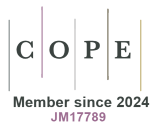Most read articles by the same author(s)
- Claudio Jommi, Antonio Addis, Nello Martini, Elena Nicod, Marcello Pani, Annalisa Scopinaro, Sabine Vogler, Price and reimbursement for orphan medicines and managed entry agreements: does Italy need a framework? , Global and Regional Health Technology Assessment: Vol. 8 No. 1 (2021): January-December 2021
- Silvia Calabria, Manenti Lucio, Giulia Ronconi, Carlo Piccinni, Leonardo Dondi, Letizia Dondi, Antonella Pedrini, Immacolata Esposito, Alice Addesi, Filippo Aucella, Nello Martini, Italian healthcare resource consumption for patients on hemodialysis treated for chronic kidney disease-associated pruritus (CKD-aP) , Global and Regional Health Technology Assessment: Vol. 11 No. 1: January-December 2024
- Giulia Ronconi, Letizia Dondi, Carlo Piccinni, Silvia Calabria, Anna Capponcelli, Antonella Pedrini, Maurizio Marangolo, Immacolata Esposito, Carmine Pinto, Nello Martini, Metastatic renal cancer: real-world evidence from a large Italian claims database , Global and Regional Health Technology Assessment: Vol. 8 No. 1 (2021): January-December 2021
- Silvia Calabria, Giulia Ronconi, Letizia Dondi, Carlo Piccinni, Antonella Pedrini, Immacolata Esposito, Pierluigi Viale, Nello Martini, Patterns of prescription, hospitalizations and costs of herpes zoster in patients at risk, from a large Italian claims database , Global and Regional Health Technology Assessment: Vol. 7 No. 1 (2020): January-December 2020
- Carlo Lucioni, Silvio Mazzi, Elisa Rossi, Rita Rielli, Silvia Calabria, Aldo Pietro Maggioni, Therapeutic Strategies and Health Costs of Patients Admitted for a Cardiovascular Event in Italy , Global and Regional Health Technology Assessment: Vol. 3 No. 2 (2016): May-August 2016
- Luigi Biancone, Gaetano La Manna, Letizia Dondi, Leonardo Dondi, Giulia Ronconi, Silvia Calabria, Irene Dell'Anno, Carlo Piccinni, Immacolata Esposito, Alice Addesi, Nello Martini, Healthcare of patients with immunoglobulin A nephropathy through a retrospective observational study of Italian administrative data , Global and Regional Health Technology Assessment: Vol. 12 No. 1 (2025): January-December 2025
- Carlo Piccinni, Letizia Dondi, Giulia Ronconi, Antonella Pedrini, Nello Martini, Giulio Marchesini, Burden of disease, healthcare pathways and costs of cardiovascular high-risk patients with type 2 diabetes: a real world analysis , Global and Regional Health Technology Assessment: Vol. 5 No. 1 (2018): January-December 2018
- Nello Martini, The Pharmaceutical Sector is at Default Risk. A Proposal to Re-Establish the Economic Balance and Define a New Governance , Global and Regional Health Technology Assessment: Vol. 2 No. 1 (2015): January-April 2015









